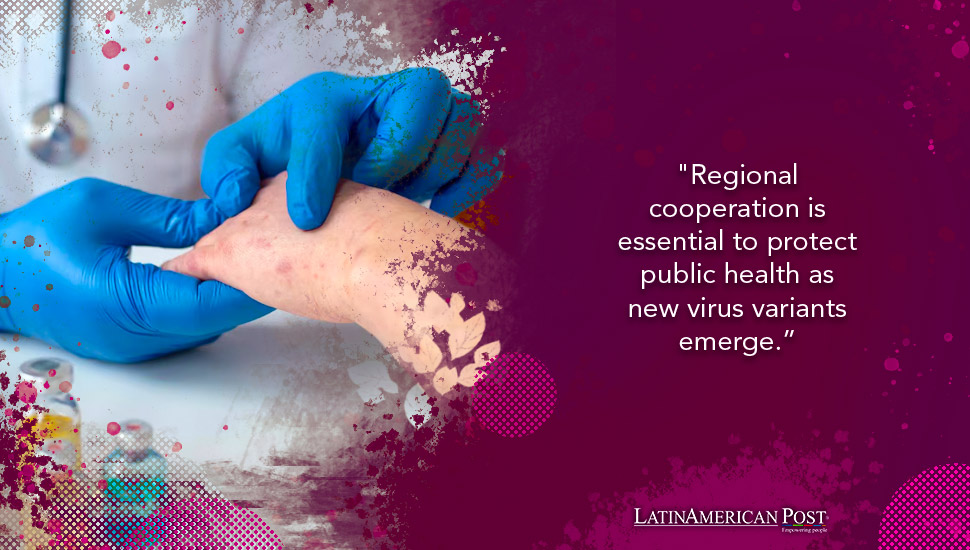Latin America Must Tighten Borders Against Growing Mpox Threat

The recent mpox quarantine in Argentina highlights the critical need for Latin American countries to bolster their border health control measures. Regional cooperation is essential to protect public health as new virus variants emerge.
The quarantine of a cargo ship near Argentina’s port of Rosario over a suspected case of mpox should serve as a wake-up call for all Latin American nations. The incident underscores the region’s vulnerability to emerging infectious diseases, particularly as global trade and travel continue to bring new health risks to our borders.
Mpox, a viral infection that the World Health Organization (WHO) has declared a global public health emergency, poses a significant threat due to its potential for rapid spread, especially with new, more contagious variants like the clade 1b strain. The response to this latest incident in Argentina demonstrates the effectiveness of swift quarantine measures and highlights the need for more comprehensive and coordinated efforts across the region.
Given the interconnectedness of Latin America’s economies and the shared borders between many countries, all regions must take proactive steps to strengthen their border health control measures. This includes responding to immediate threats and preparing for future outbreaks by enhancing surveillance, improving communication and collaboration between countries, and ensuring that health systems can handle potential pandemics.
The Importance of Regional Coordination
The mpox case in Argentina is not an isolated event. With reports of the virus spreading in multiple countries across the Americas, it is clear that a regional approach is necessary to combat the spread of infectious diseases effectively. Latin America has a long history of cooperation in public health, but the challenges posed by new and emerging pathogens require even greater collaboration.
Regional health organizations, such as the Pan American Health Organization (PAHO), are critical in coordinating efforts among Latin American countries. By sharing information, resources, and expertise, nations can better monitor and respond to health threats. This coordination is essential at border crossings, where the movement of people and goods can quickly spread infectious diseases if not properly managed.
Moreover, countries must establish standardized protocols for health screenings, quarantine measures, and managing suspected cases. These protocols should be based on the latest scientific evidence and best practices, ensuring that all nations can implement them effectively. Only through a unified regional strategy can Latin America hope to contain outbreaks before they become widespread.
Strengthening Surveillance and Preparedness
One of the most effective ways to prevent the spread of infectious diseases like mpox is through robust surveillance systems. Latin American countries must invest in the technology and infrastructure needed to monitor public health threats in real time. This includes not only traditional methods of disease surveillance, such as laboratory testing and reporting, and new technologies like digital health tools and artificial intelligence.
By enhancing surveillance capabilities, countries can detect outbreaks earlier and respond more quickly. This is particularly important in border health control, where identifying and isolating cases before they spread is critical. For example, Argentina’s swift response to the suspected mpox case on the cargo ship was made possible by an effective surveillance system that detected the symptoms and triggered the appropriate protocols.
In addition to surveillance, countries must also focus on preparedness. This means ensuring that health systems can handle an influx of patients, that medical personnel are trained to manage new and emerging diseases, and that there is a sufficient supply of necessary medical supplies, such as vaccines and personal protective equipment. Preparedness also involves conducting regular drills and simulations to test the effectiveness of response plans and identify areas for improvement.
Challenges and Opportunities for Latin America
While the need for more robust border health controls in Latin America is clear, achieving this goal will be challenging. Many countries in the region face resource constraints that limit their ability to invest in public health infrastructure and respond to health emergencies. Additionally, political instability and economic difficulties can hinder effective health policy implementation.
However, these challenges also present opportunities for innovation and collaboration. For example, countries can explore partnerships with international organizations, non-governmental organizations, and the private sector to secure funding and technical assistance for public health initiatives. By working together, Latin American nations can pool their resources and expertise to overcome common challenges and build more resilient health systems.
Another opportunity lies in adopting new technologies and approaches to public health. Digital health tools, such as mobile apps for contact tracing and telemedicine platforms, can help countries monitor and respond to health threats more effectively. Similarly, advances in genomics and molecular biology can improve the detection and characterization of pathogens, allowing for more targeted interventions.
Latin America has a rich tradition of public health innovation, and the challenges posed by mpox and other emerging diseases provide an opportunity to build on this legacy. By embracing new technologies and approaches, countries in the region can enhance their border health controls and better protect their populations from future health threats.
A Call to Action
The mpox scare in Argentina is a stark reminder of the importance of robust border health controls in protecting public health. As Latin American countries face the ongoing threat of emerging infectious diseases, they must take proactive steps to strengthen their surveillance, preparedness, and response capabilities.
Regional coordination, investment in public health infrastructure, and adoption of new technologies are all essential components of an effective border health strategy. By working together and sharing resources, Latin American nations can build a more resilient health system that is better equipped to handle the challenges of the 21st century.
Also read: Biden’s Expanded Refugee Program Transforms Latin American Migration
In the face of global health threats, no country can afford to go alone. Latin America’s success in combating mpox and other emerging diseases will depend on the willingness of its leaders to collaborate, innovate, and prioritize public health. The time to act is before the next outbreak becomes a pandemic.





